The Seasonal Allergy Market is estimated to be valued at USD 1.4 billion in 2025 and is projected to reach USD 3.0 billion by 2035, registering a compound annual growth rate (CAGR) of 7.8% over the forecast period.
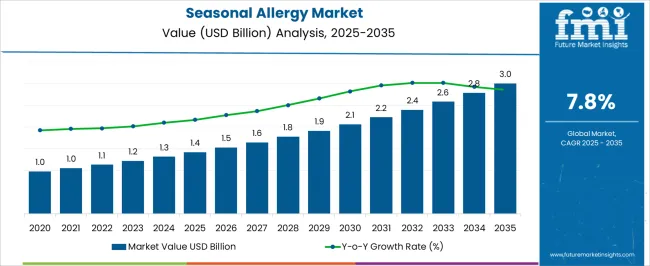
| Metric | Value |
|---|---|
| Seasonal Allergy Market Estimated Value in (2025 E) | USD 1.4 billion |
| Seasonal Allergy Market Forecast Value in (2035 F) | USD 3.0 billion |
| Forecast CAGR (2025 to 2035) | 7.8% |
The seasonal allergy market is experiencing consistent growth driven by the rising prevalence of allergic rhinitis, increasing exposure to environmental allergens, and lifestyle factors associated with urbanization. Advances in pharmacological research have enabled the development of fast acting formulations with improved safety profiles, enhancing treatment adherence among patients.
Greater consumer awareness of early symptom management and expansion of accessible over the counter options have further contributed to market expansion. Regulatory support for generic drug approvals and the availability of cost effective therapies are also shaping the competitive landscape.
The outlook remains positive as both prescription and OTC solutions continue to gain adoption, supported by oral administration formats that provide convenience, compliance, and effective relief for a large patient base.
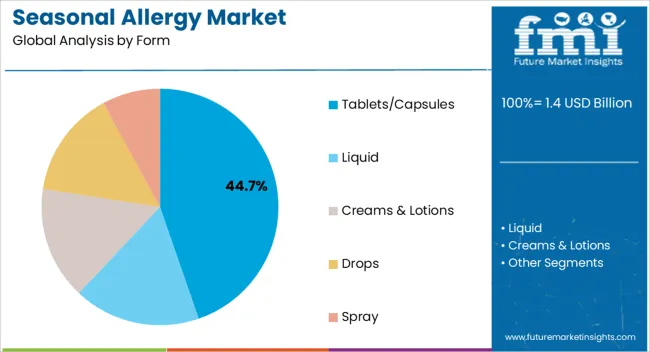
The tablets and capsules form segment is projected to represent 44.70% of the total market revenue by 2025, establishing it as the leading segment within product formulations. This growth is attributed to patient preference for oral solid dosage forms, which offer convenience, ease of storage, and predictable dosing.
High stability and extended shelf life have further reinforced adoption in both prescription and OTC markets. Tablets and capsules also enable precise formulation and the inclusion of sustained release technologies, supporting improved symptom management.
Their widespread availability across pharmacies and online platforms has cemented their role as the dominant form segment.
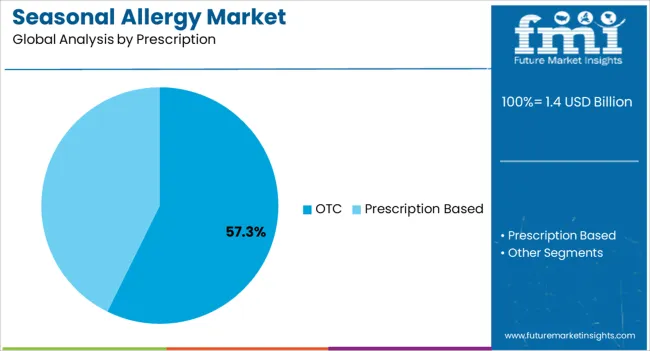
The OTC category is expected to hold 57.30% of the total market revenue by 2025, making it the leading distribution type. Growth is supported by consumer demand for accessible, affordable, and immediate solutions to manage mild to moderate allergy symptoms without medical consultation.
The availability of antihistamines and decongestants in OTC formats has expanded patient reach while reducing the burden on healthcare systems. Marketing campaigns and retail accessibility across supermarkets, pharmacies, and e commerce platforms have further contributed to this trend.
Convenience and affordability have established OTC as the preferred choice for seasonal allergy relief.

The oral route of administration is anticipated to account for 62.50% of the total market revenue by 2025, making it the most prominent segment. Its dominance is driven by patient preference for non invasive, easy to use treatment options that provide systemic relief.
Oral formulations including tablets, capsules, and syrups ensure rapid absorption and predictable therapeutic outcomes. The convenience of self administration has led to strong adherence and consistent demand across diverse patient populations.
Furthermore, the oral route supports a wide range of formulations, from generics to extended release options, reinforcing its leadership within the seasonal allergy market.
The global sales of the market are anticipated to rise at a CAGR of 7.8% between 2025 and 2035, owing to the rising prevalence of allergic diseases.
The global market holds around 5.7% share of the overall global allergy treatment market with a value of around USD 1.4 Million, in 2025.
Longer pollen seasons during warmer temperatures or higher carbon dioxide emissions brings about higher quantities of pollen. These are the key contributors to the seasonal allergies affecting an individual. The incidence rate and prevalence rate of seasonal allergies are growing rapidly owing to which the demand for available treatments is expected to increase over the forecast period.
Antihistamines, decongestants, nasal corticosteroids, allergen immunotherapy, and leukotriene receptor antagonists are some of the most well-liked treatments for seasonal allergies. Antihistamines dominate the market since they are one of the most widely used and widely prescribed medications for the treatment of allergies, both with and without a prescription.
Owing to the above-mentioned factors, the global market is expected to grow at a prominent pace, and reach a valuation of around USD 3 Billion during the year 2035.
This creates an enormous opportunity for the manufacturer to explore the seasonal allergy market. Several biopharma businesses with tested technology and cutting-edge treatment choices that are unique and have been approved have emerged as a result of the life science industry's entry into the pharmaceutical sector. This enables medical professionals to rely on these novel treatment possibilities.
For instance, allergy immunotherapy as a treatment has proven to be successful in multiple clinical trials. Such as high-dose, standardized vaccinations are used in subcutaneous injection immunotherapy (SCIT). These medications typically contain 5–20 mcg of the main allergen. SCITs are given as maintenance injections every month. Also, sublingual allergy immunotherapy (SLIT) involves the sublingual space's unique, tolerance-promoting immune cells, also known as oral Langerhans cells. Liquid antigens (drops) and pills are the two therapeutic options for SLIT.
Overall, it is anticipated that the market for seasonal allergies will rise over the coming years as more research and development are put into creating fresh, efficient treatment choices.
The market is experiencing a decline due to the adverse effects associated with allergy shots and tablets.
Periodic injections are administered over time as allergy shots. Immunotherapy for allergies is a protracted treatment that might last anywhere between three and five years. It entirely depends on the kind and degree of allergy.
Each allergy shot contains a very small amount of the exact ingredients or substances that cause allergic responses.
Patients frequently discontinue therapy in the middle of the procedure due to extended treatment schedules, age, health, physical location, and financial constraints.
The time associated with the treatment may hinder market growth.
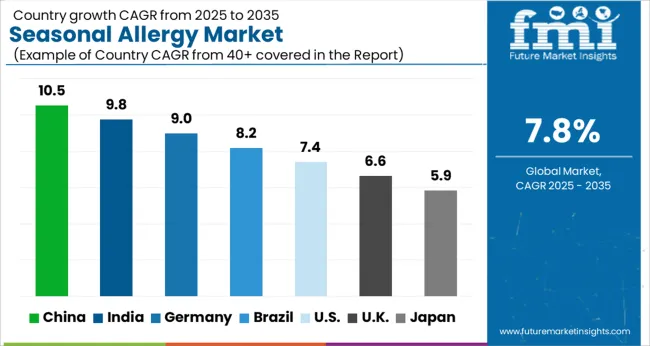
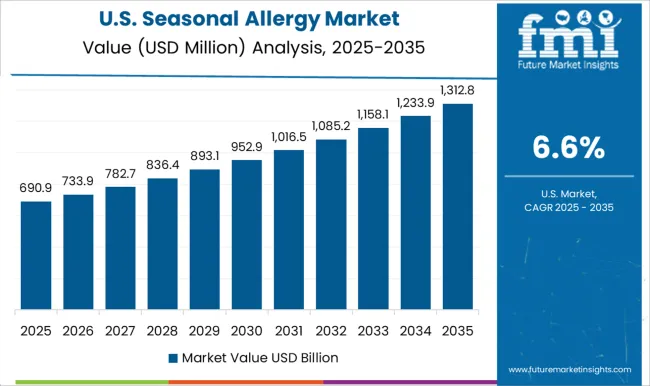
The USA dominates the North American region with a global market share of around 30.8% in 2025. In the United States, the importance of artificial intelligence (AI) in medical sciences cannot be overstated. The healthcare industry in the US is one of the largest in the world, and it faces numerous challenges, such as rising costs, an aging population, and a shortage of healthcare professionals.
AI has the potential to address many of these challenges by improving the accuracy and efficiency of medical diagnosis and treatment. For instance, in the case of seasonal allergies, AI The Weather Channel data science team has been trying to develop a tool to assist seasonal allergy sufferers as spring progresses and summer draws closer. Allergy Insights with Watson, a new service that uses AI to assist forecast seasonal allergy risk in the United States, is freely accessible on The Weather Channel app and weather.com.
In order to aware people in making the more appropriate decisions and preparing for allergy season, united states in going to witness an exponential growth in the global market
China has a market share of 9.5%, with a market value of USD 1.4 Million in the global seasonal allergy market in 2025.
In China, allergy immunotherapy (AIT) has been practiced for more than 60 years. The Chinese College of Allergy and Asthma (CCAA), a specialized branch of CDMA that serves as the primary certifying body for AIT, was formed in 2020 with the backing of the Chinese Medical Association (CMA) and the Chinese Medical Doctors Association (CMDA). Chinese allergists and researchers have made significant advancements in the creation of AIT. Chinese allergists and researchers have published a large number of articles globally that include original research investigations, systematic reviews, case studies, and clinical trials. Sublingual immunotherapy (SLIT) is starting to gain popularity in China, where traditional subcutaneous immunotherapy (SCIT) is now the favored AIT.
Similar to the United States, immunotherapy is popular in China and it is expected to establish a steady growth in the coming years.
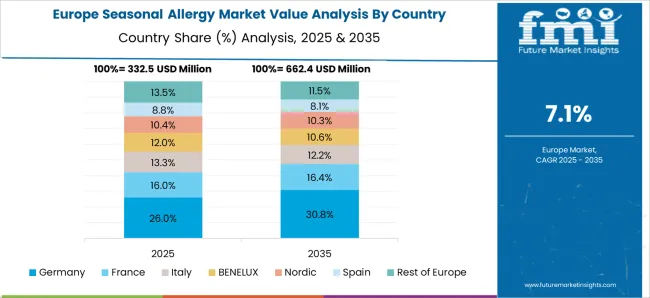
Germany holds a market share of 8.7% in 2025 in the global seasonal allergy market, owing to the presence of many established players in European countries.
Germany is a global leader in biotechnology, and the environment for the growth of commercial biotechnology is only improving. This has a favorable impact on the growth of new businesses that specialize in this industry. There were more businesses between 2020 and 2020 by 20.7%. Germany continues to be the top European nation for funding the biotechnology sector. 78% of the industry's overall budget in 2020 was generated through venture capital and initial public offerings (IPOs). About 70% of all businesses in Germany use biotechnology for medical purposes, which is particularly significant in light of the recent developments brought on by COVID-19.
Germany is strengthening its manufacturing and development of novel drugs which will positively grow the market in the future.
India holds a share of around 6.6% in the global market in 2025.
The prevalence of allergies and asthma is increasing in India, and it has turned into a serious health issue. Symptoms can range from mild rhinitis to severe asthma, and even life-threatening anaphylaxis. This subcontinent has a very broad "allergen repertoire" because of its distinct climatic conditions, flora, and dietary customs. To make an accurate diagnosis and create immunotherapeutic vaccines, allergy-eliciting chemicals must be correctly identified, purified, and molecularly characterized. Although there are many reports on common allergies, the majority of these studies relied on early allergen detection and identification. Recombinant technologies and structural biology have only been used to characterize a small number of these allergen compounds.
There are still millions of cases of the disease worldwide, despite India's prevalence rates generally being lower than those of high-income countries. Due to the large number of patients, Indian biopharmaceutical companies must enhance their supply of treatment medications.
Tablets/Capsules are mostly favored by patients suffering from allergies. It has contributed USD 1.4 Million to the global market in 2025.
Because of its durability and patient acceptability, the tablet is the most commonly utilized dosage form out of all those that are available. As a result, the coating plays a crucial role in the tablet's composition. The superior aesthetic qualities, such as color, texture, mouth feel, and flavor masking, depending on the film and sugar coatings. This makes tablets/capsules the most lucrative form.
OTC led the global market with over 76.0% value share in 2025. Customers find it simpler to buy OTC medications because they are widely accessible and may be purchased without a prescription. People can save time and money by not having to wait for prescriptions to be filled or make appointments with doctors. More people can afford OTC medications because they are often less expensive than prescription medicines.
Oral is mostly preferred by patients. It has a market share of 36.6% in the global market in 2025. Oral drugs are uncomplicated to administer, patients can take them at home without a doctor's supervision. Oral drugs are advantageous for those with chronic illnesses who require long-term care. Oral drugs are typically less expensive than those administered intravenously or orally, which necessitate more specialized equipment and physician oversight.
Antihistamines have a market share of 46.0% in the global market in 2025.
The ease of use and accessibility of over-the-counter antihistamines is high. Second-generation antihistamines are also thought to be a better option. However, each one must be assessed based on their particular efficacy and safety.
Hospital pharmacies hold a market share of 35.9% during the year 2025. Hospitals are the primary locations where readily available, licensed, and approved medication can be found. By collaborating with doctors, nurses, and pharmacy staff to provide the proper medications and supplies during treatment procedures, hospital pharmacies can significantly improve patient care. Hospitals can exceed their patient satisfaction goals with the guarantee of improved patient outcomes. Due to the extensive treatment offered in hospital settings, the category is predicted to expand at a profitable rate throughout the projection period.
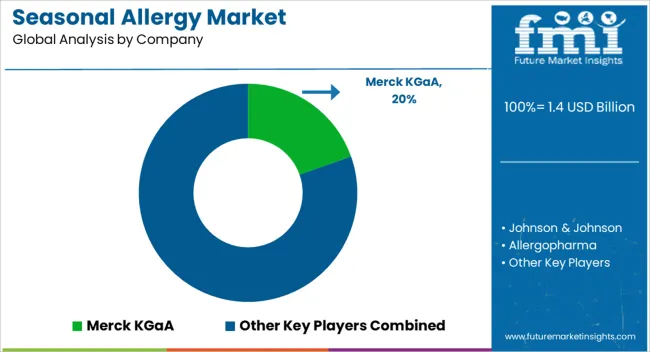
Collaboration with scientific and research foundations to increase public awareness and receiving product approvals from regulatory bodies are the key strategies opted by key players within this market space.
Similarly, recent developments related to companies within the seasonal allergy market space have been tracked by the team at Future Market Insights. These are available in the full report.
| Attribute | Details |
|---|---|
| Forecast Period | 2025 to 2035 |
| Historical Data Available for | 2020 to 2025 |
| Market Analysis | USD Million for Value |
| Key Regions Covered | North America; Latin America; Europe; South Asia; East Asia; Oceania; and the Middle East & Africa |
| Key Countries Covered | The USA, Canada, Brazil, Mexico, Argentina, the United kingdom, Germany, Italy, Russia, Spain, France, Benelux, India, Thailand, Indonesia, Malaysia, Japan, China, South Korea, Australia, New Zealand, Türkiye, GCC Countries, North Africa and South Africa |
| Key Market Segments Covered | Form, Prescription Type, Route of Administration, Treatment, Distribution Channel |
| Key Companies Profiled | Merck KGaA; Johnson & Johnson; Allergopharma; Sanofi SA; McNeil Consumer Healthcare,; Genentech Inc.; GlaxoSmithKline PLC; Leti Pharma,; Alerpharma S.A; Allergan, Inc.; Meda Pharmaceuticals, Inc; Novartis International AG; Bausch Health Companies Inc.; Allergopharma; ALK Abello; Stallergenes Greer; Allergy Therapeutics; Aimmune Therapeutics; Biomay AG; HAL Allergy Group; Bayer; AstraZeneca |
| Pricing | Available upon Request |
The global seasonal allergy market is estimated to be valued at USD 1.4 billion in 2025.
The market size for the seasonal allergy market is projected to reach USD 3.0 billion by 2035.
The seasonal allergy market is expected to grow at a 7.8% CAGR between 2025 and 2035.
The key product types in seasonal allergy market are tablets/capsules, liquid, creams & lotions, drops and spray.
In terms of prescription, otc segment to command 57.3% share in the seasonal allergy market in 2025.






Our Research Products

The "Full Research Suite" delivers actionable market intel, deep dives on markets or technologies, so clients act faster, cut risk, and unlock growth.

The Leaderboard benchmarks and ranks top vendors, classifying them as Established Leaders, Leading Challengers, or Disruptors & Challengers.

Locates where complements amplify value and substitutes erode it, forecasting net impact by horizon

We deliver granular, decision-grade intel: market sizing, 5-year forecasts, pricing, adoption, usage, revenue, and operational KPIs—plus competitor tracking, regulation, and value chains—across 60 countries broadly.

Spot the shifts before they hit your P&L. We track inflection points, adoption curves, pricing moves, and ecosystem plays to show where demand is heading, why it is changing, and what to do next across high-growth markets and disruptive tech

Real-time reads of user behavior. We track shifting priorities, perceptions of today’s and next-gen services, and provider experience, then pace how fast tech moves from trial to adoption, blending buyer, consumer, and channel inputs with social signals (#WhySwitch, #UX).

Partner with our analyst team to build a custom report designed around your business priorities. From analysing market trends to assessing competitors or crafting bespoke datasets, we tailor insights to your needs.
Supplier Intelligence
Discovery & Profiling
Capacity & Footprint
Performance & Risk
Compliance & Governance
Commercial Readiness
Who Supplies Whom
Scorecards & Shortlists
Playbooks & Docs
Category Intelligence
Definition & Scope
Demand & Use Cases
Cost Drivers
Market Structure
Supply Chain Map
Trade & Policy
Operating Norms
Deliverables
Buyer Intelligence
Account Basics
Spend & Scope
Procurement Model
Vendor Requirements
Terms & Policies
Entry Strategy
Pain Points & Triggers
Outputs
Pricing Analysis
Benchmarks
Trends
Should-Cost
Indexation
Landed Cost
Commercial Terms
Deliverables
Brand Analysis
Positioning & Value Prop
Share & Presence
Customer Evidence
Go-to-Market
Digital & Reputation
Compliance & Trust
KPIs & Gaps
Outputs
Full Research Suite comprises of:
Market outlook & trends analysis
Interviews & case studies
Strategic recommendations
Vendor profiles & capabilities analysis
5-year forecasts
8 regions and 60+ country-level data splits
Market segment data splits
12 months of continuous data updates
DELIVERED AS:
PDF EXCEL ONLINE
Allergy Diagnostic Market Forecast and Outlook 2025 to 2035
Allergy Tester Market Size and Share Forecast Outlook 2025 to 2035
Seasonal Influenza Vaccines Therapeutics Market Size and Share Forecast Outlook 2025 to 2035
Allergy Immunotherapy Market Analysis - Size, Share & Forecast 2025 to 2035
Seasonal Affective Disorder Therapeutics Market Trends – Growth & Forecast 2025 to 2035
Market Share Breakdown of Allergy Immunotherapy Providers
Allergy Treatment Market Analysis - Demand & Forecast 2024 to 2034
IgE Allergy Blood Tests Market Size, Growth, and Forecast 2025 to 2035
Food Allergy Market Size and Share Forecast Outlook 2025 to 2035
Food Allergy Immunotherapy Market Analysis Size and Share Forecast Outlook 2025 to 2035
Nasal Allergy Treatment Market Size and Share Forecast Outlook 2025 to 2035
Birch Allergy Treatment Market Analysis by Drug Class, Route of Administration, Distribution Channel and Region: Forecast from 2025 to 2035
Ocular Allergy Diagnostic System Market Size and Share Forecast Outlook 2025 to 2035
Pollen Allergy Market Size and Share Forecast Outlook 2025 to 2035
Veterinary Allergy Diagnostics Market Size and Share Forecast Outlook 2025 to 2035
Needle Free Allergy Therapy Market Size and Share Forecast Outlook 2025 to 2035
Depression And Seasonal Affective Disorder Therapeutics Market Size and Share Forecast Outlook 2025 to 2035

Thank you!
You will receive an email from our Business Development Manager. Please be sure to check your SPAM/JUNK folder too.
Chat With
MaRIA